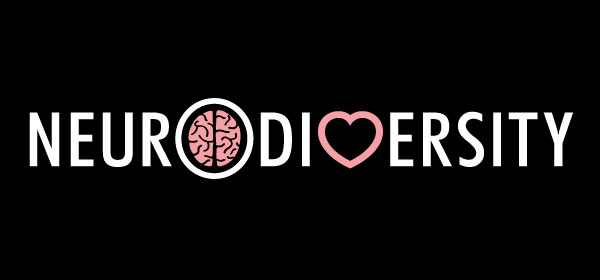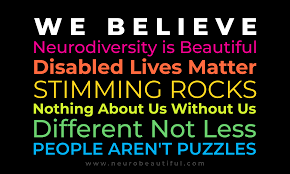Autism
We recognize that many neurodiverse individuals have had negative experiences with other medical providers. Our office is a safe space for you. You will be heard and respected. You are welcome to bring someone with you if it makes the experience better for you.
Autism Spectrum
Autism, Asperger’s and Neurodevelopmental Disorder are on a continuum called Autism Spectrum Differences (ASD). It is our view that people with autism have a neurologically based difference in interpreting and responding to abstract information: impacting social skills, emotional understanding, dating etc. Our goal is to give a ‘Users Manual’ to the person/family. While there can be disability within any neurological style, our goal is to teach an understanding of self and self acceptance/advocacy.
Autism Treatment Goals:
- Meet your community! There are many great resources. I highly recommend only following autistic individuals, and not ‘professionals’. Here are some to get you started: #ActuallyAutistic, Thinking Persons Guide to Autism, Welcome to the Autistic Communit, Facebook Community Groups
- Biology of autism & co-occuring challenges: understanding your brain (ie, Autism, Sensory Processing, Executive Functioning, Panic, Meltdowns, Shutdowns, Anxiety)
- Acceptance & Validation: self acceptance, process past bullying/isolation, assistance with negative self talk that creates anxiety / depression
- Advocacy & Equity: when and how to teach others about autism, requesting accommodations, Job Accommodation Network
- Self Care: reconsider how to change work/school to respect your brain style
- Independence: independent living skills, job interview skills
- Dating & Gender Identity: Nonbinary Network
- Social Connections: friendship & dating (Dr. Arnold has been trained in PEERS.), Autreat, Autastic

Autism – Assessment Resources
Note: We are not doing evaluations to differentiate autism from borderline personality disorder, mood disorder, bipolar disorder and/or PTSD. Inidividals with these needs will be referred for a broader assessment. Our assessments are focused on autism and related executive function, sensory and adaptive impairments as well as anxiety and stress from autism.
Note: An autism diagnosis indicates autism at the level of disability. While testing can disern if you have autistic traits, it is possible that an assessment will not result in an autism diagnosis.
You may want to complete these free online screeners before our meeting:
You may want to copy some of the information below into your own document and write personal notes under each section for ideas of what to share in our meeting:
The Univeristy of Washington supports self diagnosis for autistic adults. Here is the article explaining this with fantastic resources.
Autism – Gifted (2E) Kids/Teens/Young Adults
We work alot with kids/young adults who have been identified as gifted (and often perfectionistic) who are now realizeing autism may be a more appropriate description. Most providers ‘rarely’ meet these kids; we know thousands of them. Many of these kids have significant trouble with: executive functions, getting their GPA to match their intellect, expository writing, maintaining friends, dating, social anxiety, perfectionism, and self acceptance.
Here is a letter to a parent from an autistic adult, if they could have written it as a child.
We support families working through what is often referred to as Pathological Demand Avoidance. Renamed by the autistic community as Pervasive Drive for Autonomy. Here is a link on why an autistic person may be agitated. Here is a link for parents if you are experiencing burnout.
Autism – Adults
Note: We are not doing evaluations to differentiate autism from borderline personality disorder, mood disorder, bipolar disorder and/or PTSD. Inidividals with these needs will be referred for a broader assessment. Our assessments are focused on autism and related executive function, sensory and adaptive impairments as well as anxiety and stress from autism.
We welcome autistic adults into our practice! We understand that living with untreated and often unlabeled autism creates challenges. Autistic adults often ask for assistance with: Job Performance review / Work challenges, Dating / Couples issues, Loneliness / Friendship challenges, severe anxiety and depression. Many autistic adults are seeking validation of the significant impact undiagnosed autism has had on the life and mental health.
We understand that women are routinely underdiagnosed and misdiagnosed. We welcome women who are trying to understand if their challenges (or know their challenges) are related to Autism. Here is an excellent video on what Aspergirls wish other’s understood about them, and a video on social mimicking. Our office is a safe space for neurodiverse people, you will not be judged or invaldiated here.
Autism – Education
Dr. Arnold has worked closely with her close friend and colleague, Karla Fisher, to create infographics for individuals on the spectrum. Ms. Fisher is a brilliant person with autism whose shared goal is to language AS / NT thinking differences. Our work can be found on our Facebook pages: Karla’s ASD Page & New Leaves Clinic. Ms. Fisher was also noted in Dr. Temple Grandin’s book: Different Not Less. Dr. Arnold’s experiences, training, research projects and publications are extensive. Please reference her biography and resume for a more complete understanding of her lifelong dedication to developmental differences.
I can not possibly say enough positive things about Unmasking Autism. Everyone, literally everyone, should read/listen to this book.



